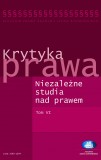Miłuj bliźniego swego jak siebie samego! Tołstoj kontra Petrażycki w sprawie społecznego znaczenia prawa i moralności
Love thy neighbor as thyself! Tolstoy versus Petrażycki on the social significance of law and morality
Author(s): Katarzyna TynkiewiczSubject(s): Russian Literature, 19th Century, Philosophy of Law
Published by: Akademia Leona Koźmińskiego
Keywords: the idea of love of neighbor; the ideal of love; Leo Tolstoy; Leon Petrażycki; law and morality;
Summary/Abstract: The article is a polemic between Leo Tolstoy, a Russian writer and a moralist of the nineteenth century, and Leon Petrażycki, a Polish lawyer and a philosopher of law of that period – on the social significance of law and morality. Tolstoy’s and Petrażycki’s roads crossed due to a young man named Krutik, a law student at the University of St. Petersburg. Krutik wrote a letter to Tolstoy, whom he considered a moral authority, asking to dispel his doubts caused by reading the works of Petrażycki. Indeed, Tolstoy affirmed that the appropriate regulator of human life is morality. In contrast, Petrażycki proclaimed that the raison d’être has both morality and law, but if one compares their social significance, the higher value should be given to the law. Krutik had a dilemma, which thinker to agree with? Analysis of Tolstoy’s and Petrażycki’s views made in this article leads to the conclusion that in fact they were arguing about how to implement the idea of love, somewhat differently interpreted by them. While Tolstoy categorically rules out the possibility of realizing it on legal grounds, Petrażycki was firmly convinced that the law can, absolutely, be its carrier.
Journal: Krytyka Prawa
- Issue Year: 6/2014
- Issue No: 1
- Page Range: 211-224
- Page Count: 14
- Language: Polish

